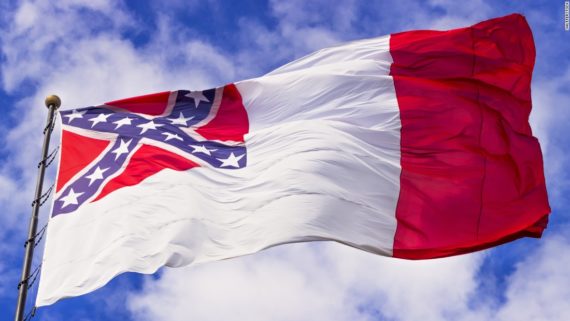Is the South today a captive nation? Most Southerners would never consider the question—most likely because they would deem the issue to be absurd. But is it inane to ask such a question—is it forbidden in politically correct America to ask such a “confrontational” question? Conservatives would immediately dismiss such rhetorical questions as being unpatriotic or even treasonous—after all, everyone knows we live in “one nation, indivisible, with liberty and justice for all.” Liberals, on the other hand, would immediately dismiss the question by repeating two words—slavery, racist, slavery, racist, etc., etc., etc. Despite the soft-censorship efforts of both left and right to limit free discussion, the question will be asked!
What are the hallmarks of a captive nation?[1] What are the features captive nations share that distinguish them from sovereign nations? I can think of at least seven features which current captive nations share with other captive nations in modern history:
First: The captive nation’s former military forces were defeated by the invading nation’s military. From now on, the invading nation will be referred to as the “Empire” because most, but not all, captive nations were/are victims of Empires, such as captive nations held by the former Soviet, Nazi, Japanese, and British Empires.
Liberals and most conservatives will immediately dismiss the question based upon their assertion that the South is not a captive nation because it was never a nation and therefore, by definition, cannot be a captive nation. What are the parameters of a nation? Did the South measure up to the description of a nation from 1861 to 1865?
The historical record is clear for those who understand history—as opposed to those who blindly accept the victor’s narrative about the conflict of 1861-5. The Confederate States of America was formed by Sovereign States; it had a formal government with all the attributes of American government such as a congress, president, constitution, and flag; the Confederate Government was based upon the free and unfettered will (consent) of the voting public;[2] the Confederacy had a military establishment; and the Confederate Government enjoyed the support of its citizens. Public support for the Confederate Government is demonstrated by taking the number of citizens who died in the struggle to defend the South and normalizing that number to the 2010 Southern population—the number of Southern deaths would equal to approximately 3.5 million.[3] Only those who worship Lincoln and the supreme Federal Government he created would blindly assert that the Confederate States of America was not a nation.
Second: After an Empire’s successful invasion, it establishes puppet governments to rule the captive nation. In 1932, the Japanese Empire set up its puppet government in Manchuria declaring Puyi the Kangde Emperor of Manchukuo. Establishing puppet governments in conquered territories is a common technique used by empires to lessen the cost of maintaining order and preventing revolts—it also gives the invasion the façade of legitimacy. The British established a puppet government in Ireland and even allowed the occupied Irish the “privilege” of electing Irish representatives to send to the British-dominated Parliament. As in all empires, the puppet master pulls the strings that cause the puppets to dance to their master’s tune.
After its military had completely occupied the South, the Federal Government established “new” Southern state governments that were required to obey the will of the puppet masters in the Federal Congress. In America, “just” governments derive legitimacy based upon the “consent of the governed.”[4] Four long years of bloody conflict proves that the Southern people were no longer willing to give their consent to be governed by the Federal Government. These Federally established “new” governments were based not upon consent but upon military and political coercion. Therefore, any American government based upon coercion is illegitimate—it is, in fact, a puppet of the coercive power that installs and maintains it. Voting in elections does not bestow legitimacy (consent) upon these governments any more than the fact that the Irish were allowed to vote for Irish representatives to send to the British-dominated Parliament bestowed legitimacy upon the British Empire’s occupation of Ireland.
Third: The people of a captive nation are forbidden or punished for displaying national pride. The flying of the occupied nation’s flag, the veneration of national heroes, and participating in or displaying national traditions, holidays, and other national cultural activities are banned or discouraged. The British Empire used these tactics against the Scottish people after defeating Scottish armies in 1746. The British Parliament enacted the Act of Proscription which outlawed significant aspects of Gaelic culture. It was said that Scots were arrested for playing outlawed tunes on outlawed pipes. Cultural genocide is commonly used by empires to suppress feelings of national self-determination. The South is currently suffering an intense round of anti-South cultural genocide. But it is not just a recent occurrence.[5]
Fourth: Empires attempt to reduce the captive nation’s native population via genocide or repopulation with “loyal” citizens. The Turks did it against the Armenians; the Soviets did it to the Baltic States; and Japan did it against the native population of Manchuria. The South suffered direct genocide at the hands of federal armies. Yankee General James Lane declared, “We believe in a war of extermination.” Another Yankee officer declared that his orders were, “the adoption of all means not only to crush out the rebellion but to punish all persons who live in the rebellious territory.”[6] Indirect genocide resulted from deaths arising from malnutrition that followed in the wake of invasion, defeat and the establishment of federal puppet governments.[7]
General Sherman declared that to control Georgia, it must first be “repopulated.”[8] Currently, the Federal Government is repopulating states with cultural aliens from third world countries, but its most successful “repopulation” efforts have been the replacing of the native population of Southern counties in Virginia and Maryland with highly paid, liberal voting, federal clients, and bureaucrats.[9]
Fifth: Empires use the technique of divide and rule to maintain its rule over captive nations. Divide and rule is a technique in which the occupying power divides the local population into antagonistic interest groups (typically along preexisting social/racial fault lines) and sides with one group by giving it political power over the other local group. Divide and rule “makes the policing of a subordinate people easier and less expensive.”[10] The Federal Government used divide and rule during Reconstruction reaping Republican support from black Southerners, while the Democratic Party gained support from white Southerners during the era of white supremacy. In both cases, the winners were the ruling elites in Washington, D.C., whereas the losers were rank and file black and white Southerners.[11]
Sixth: The captive nation’s citizens who cling to traditional values are held up for public ridicule by the Empire’s propaganda agents. The captive nation’s traditions and language (including local dialect/accent) are openly mocked and disparaged. The captive nation’s children are taught to abandon the “old ways” and adopt the Empire’s language and customs while replacing “old-fashioned” religious faith with the Empire’s ideology. The mockery of the Bible Belt South is an example of how the Federal Government’s propaganda agents heap derision upon traditional conservative Southern values.
Seventh: “Resistance is futile—all will be assimilated.” All empires attempt to convince the captive nation’s rising generations that it is futile to consider rising against the empire. The empire’s goal is to create generations of pacified subjects who will eventually accept as “normal” their position as a second-class, impoverished section of the “indivisible” empire.
Is Dixie a captive nation? Yes, the South certainly has the features of a captive nation. Conservatives will scoff at the idea while pointing to “Old Glory” and declaring that we live in a democracy with “liberty and justice for all.” Liberals will refuse to consider the question while hiding behind a smoke screen of “slavery and racism.” It remains to be seen whether Southerners will ever consider the question.
[1] Captive Nations Week is the third week in July. It is an outgrowth of U.S. Public Law 86-90 signed by President Eisenhower in 1959. It was part of the U.S. anti-communist Cold War effort. Historically, there have been many other captive nations.
[2] Voting qualifications used by the seceding Southern states were very similar to those used in the North in 1860 and in the Thirteen Colonies in 1776.
[3] DiLorenzo, Thomas, in Rethinking the American Union, Donald Livingston, ed. (Pelican Publishing Co., Gretna, LA: 2013), 80.
[4] See Joint Declaration of Independence.
[5] Kennedy & Kennedy, The South Was Right! (Pelican Publishing Co., Gretna, LA: 1994), 271-303, Chapter 13, The Yankee Campaign of Cultural Genocide.
[6] Kennedy & Kennedy, Punished With Poverty-the Suffering South (Shotwell Publishing Co., Columbia, SC: 2016), 69 & 76.
[7] Ibid, 111-2, 182-3.
[8] Ibid, 77.
[9] Ibid, 157-60.
[10] Johnson, Chalmers, The Sorrows of Empire (Henry Holt & Co., New York: 2004), 131.
[11] Kennedy & Kennedy, Punished With Poverty-the Suffering South, 13, 66, 84, 123.







